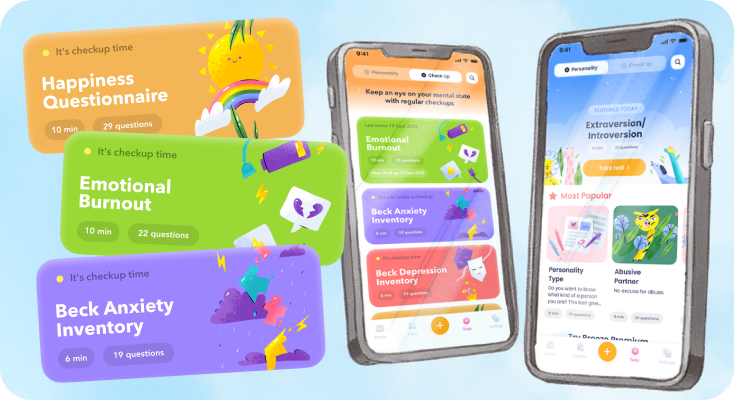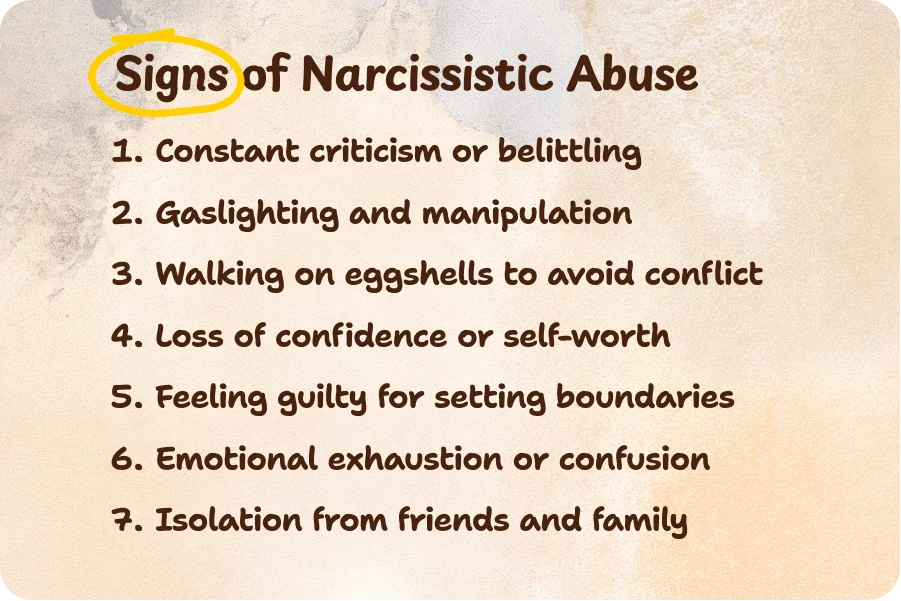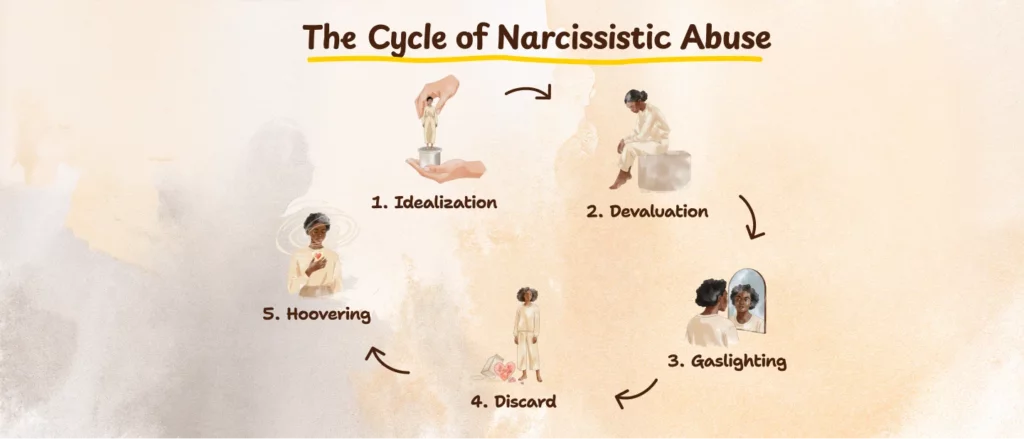Narcissistic abuse often starts slowly with constant admiration and intense confessions like “I’ve never met anyone like you”, but as the relationship progresses, it can turn into different patterns of verbal abuse. You may hope that your partner’s behavior will change soon, but it is slowly harming your self-esteem and overall mental health.
Let’s explore the behavior patterns of people with narcissistic personality disorder and narcissistic tendencies, the signs of narcissistic abuse, its effects on your mental health, and how to begin healing.
What Is Narcissistic Abuse?
Narcissistic abuse is a form of psychological abuse in which the victim becomes the object of control and manipulation by a person with narcissistic traits or narcissistic personality disorder (NPD). During an abusive relationship, the victim usually goes through a cycle of emotional abuse, experiencing tactics such as love-bombing, devaluing, criticism, blame-shifting, and gaslighting.
No matter how hard the victim tries to please the narcissist, they will most likely never be satisfied. The narcissist’s sense of power grows when they see their victim under their control.
As a result, the victim of narcissistic abuse may live with a permanent feeling of being unworthy of their partner and wonder, “Why am I such a failure?“. This level of stress and tension harms physical health and mental well-being. According to research on narcissistic abuse, survivors may experience symptoms similar to PTSD, such as intrusive thoughts, flashbacks, and feeling extremely alert, as well as body aches [1].
Wondering, “Why do I attract narcissists?” Find out if childhood trauma or patterns from growing up with a narcissistic parent are affecting your life today.
8 Signs of Narcissistic Abuse with Examples
Spotting these signs of narcissistic abuse can help you recognize a toxic relationship and protect your well-being. Here are some indicators that you might be in a relationship with a narcissist:
1. They make you feel confused with hot-and-cold behavior
Narcissistic partners may express inconsistent affection, switching between extreme kindness and unexpected coldness to keep you off balance. Today, they admire you, saying, “You are so special” or “I’ve never felt so happy with anyone,” only to be distant and indifferent tomorrow. Eventually, these abusive patterns in romantic relationships can make you think, “Why do I get attached so easily?“
2. They criticize you to maintain control
This narcissistic behavior may be disguised as jokes or brutal honesty, when in reality, it’s verbal abuse, name-calling, arrogant sarcasm, overt or covert humiliation, and unhealthy comparisons with others. All these narcissistic manipulations are designed to decrease your self-esteem and make you wonder, “What is wrong with me?”.
They might express surprise by saying something like, “Wow, you actually did that? I didn’t think you were capable”. Or mock you with seemingly harmless phrases like, “I’m only joking, but look how easily Jane manages her schedule compared to you.” You can mistake their rudeness for awkward frankness or constructive criticism and begin to prove that you’re not so bad after all.
3. They gaslight you to undermine your sense of self
If you question their perception of events, a person with abusive behavior may call you crazy. This is the word they can use to describe any emotional reaction their partner may have to their inconsistent behavior.
This gaslighting may later evolve into a complex type of emotional torture that may cause you to doubt your own perception of clear emotional abuse and lose trust in what once seemed real, according to recent research on the effects of gaslighting [2].
People experiencing narcissistic abuse may hear phrases like:
- “You have mental health issues.”
- “Learn to trust people.”
- “You can’t communicate like a normal person.”
These phrases create the feeling that you are the cause of the relationship problems, which increases your dependence on the narcissist’s opinion. They make you perceive your feelings as inappropriate or excessive and wonder, “Why am I so emotional?”. You may begin to doubt your sanity and think about how to control your emotions.
4. They use emotional blackmail
Another sign of narcissistic abuse is manipulating your emotions to get what they want, using fear, guilt, or obligation. They may say, “If you don’t do as I say, then we’re breaking up,” or threaten to stop loving or supporting you. They can even threaten self-harm, saying, “If you leave me, I’ll hurt myself,” to control you through fear.
5. They hit you where it hurts most
If you tell them what you’re most afraid of, they make a sarcastic remark about it. Likewise, if you share what you’re most proud of, they’ll find a way to devalue your accomplishments and convince you they’re nothing special.
For example, if you admit you feel insecure about your appearance, they might say during an argument, “No wonder you’re so self-conscious. Everyone can see why.” Or, when you’re excited about a personal project, they respond with “That’s cute, but it’s not like it’s real success.”
Do you suspect you’re dealing with a narcissistic abuser? Take an emotional abuse test to find out.
Besides, the Breeze app offers a variety of quizzes, such as the avoidant attachment style quiz, temperament test, friendship quiz, and many more, to help you understand how to spot emotional abuse and form healthy relationships.

6. They use silent treatment
A person may use this form of narcissistic abuse in any uncomfortable situation. They refuse to speak to you for hours or days to punish, control, or manipulate. Silent treatment is always demonstrative.
For example, a person completely ignores you, continuing to communicate with others as if nothing had happened. If they do engage in communication, their responses are short, sometimes rude, and there is no eye contact.
It can also be accompanied by physical distancing. If they don’t like what you’re saying, they may go to another room, avoid sitting at the same table, or leave the house at an unusual time without saying when they will return. Sometimes, the person using silent treatment openly declares that they won’t speak to you until you do what they want.
7. They convince you that you should be grateful for their love and attention
Another common sign of narcissistic abuse is making you believe that no one needs you and no one but them will love you. They can say, “You’re lucky you have me to guide you. Otherwise, who knows what you’d do?” or “You’re an unbearable person. Be grateful that I tolerate you!”
The goal of this tactic is to make you feel weak and dependent. To increase your sense of helplessness even more, they may also say something like, “It’s funny how you think you can handle that on your own.”
8. They make you feel isolated
They may try to isolate you from the support of friends and family members, making you even more dependent and vulnerable to emotional abuse. Additionally, they may criticize your friends or want you to drop your plans for them.
According to the National Domestic Violence Hotline, a person with narcissistic personality disorder can expect to be prioritized above everyone else and insist on special treatment [3]. If you refuse, they may guilt-trip you and make you feel responsible for their emotions with phrases like “If you really loved me, you wouldn’t make me feel this way” or “If you really cared about me, you’d do this for me”.

Narcissistic Abuse Cycle
The pattern of relationship with a narcissistic abuser usually follows a predictable cycle. It includes a period of over-idealization, followed by incidents of devaluation, gaslighting, and finally discard [4]. Sometimes, the narcissistic abuse cycle also ends in “hoovering,” when the narcissist tries to pull you back in.
1. Idealization
The narcissistic abuser initially idealizes you. They may flatter you excessively, showering you with compliments and gifts, telling secrets and personal stories to create a special intimacy, encouraging you to share your deepest fears and desires in return. They may tell you, “I’ve never met anyone like you. You complete me,” pushing for emotional intimacy very quickly.
During this honeymoon phase, you may fall so deeply in love that you feel like you can’t live without them. The reason is their love-bombing that makes you feel beautiful, loved, adored, and certain you’ve found your soulmate. The narcissistic abuser pretends to share your values and interests to convince you they’re the one you’ve been looking for.
2. Devaluation
On this stage, they will weaponize your openness, hitting you where it hurts most to control you psychologically. Generally, abusive partners pay you minimal attention, just enough to keep you close and make you dream of a return to the idealization stage.
Devaluation, combined with periodic love-bombing, teaches you to tiptoe around them, hoping for a return to the honeymoon phase. The narcissist plays on your natural need for validation and approval, as well as the feelings of worthlessness they instilled during the abusive cycle, to reinforce your emotional dependency.
3. Gaslighting
Further narcissistic manipulation is telling you that you’re imagining things. You may find it difficult to end an abusive relationship due to constant gaslighting. Because of emotional manipulation, you may wonder, “Why do I feel guilty all the time?” or “Why am I so sensitive?” Eventually, you can mistakenly conclude that their abusive behaviors are just misunderstandings and that their mood shifts are the result of your own misbehavior.
4. Discard
However, sometimes the abusive person can manipulate their partner into returning with false promises and fake apologies, pretending to have changed, but in reality, to regain control. They may use shared memories or crises to reconnect, begging you to give them another chance. This stage restarts the cycle.
5. Hoovering
This cycle can repeat over and over again until a temporary rejection, when the abuser abandons you in a fit of narcissistic rage or ignores you if you want to discuss your relationship with them. Although the cycle is not time-limited, in the end, you will probably be rejected, especially if you notice warning signs and realize the narcissist’s intentions or want to leave them.

Effects of Narcissistic Abuse
According to research on victims of narcissistic abuse, they often feel as though they have lost their sense of self [5]. That’s why they may begin to question their previous beliefs, reconsider their core values and relationship goals, and show people-pleasing tendencies to suit the narcissist’s demands.
As a result of emotional abuse and constant self-doubt, they may also lose a sense of control over their life, unable to make any decisions independently, from what to wear for a walk to what career is right for them.
The effects of narcissistic abuse can vary depending on how long a person remains in such a relationship [1]. Some recover and rebuild their lives, while others may experience lasting symptoms of mental health conditions such as anxiety and depression. They may also have mood shifts and difficulties concentrating, wondering, “Why can’t I focus?”
Expert Insight
In my opinion, the most harmful effects of narcissistic abuse are the emotional ones. This kind of abuse can cause a person to question their version of reality. It can cause their self-worth to plummet. They may feel as though they can’t trust themselves anymore. Narcissistic abuse can cause anxiety and hypervigilance. A person may constantly worry that they might do something wrong. This may leave them feeling on edge. They may isolate themselves, which can further erode their mental well-being.
Emily Mendez
Mental health professional
Narcissistic Abuse Recovery
The main steps to recover after the emotional abuse in a relationship with a person with narcissistic personality disorder or narcissistic traits are the following:
1. Journal to rebuild your self-esteem and identity
Try Breeze guided journaling:
- Reflect on who you were before the relationship and make a list of your values, interests, and dreams.
- Think about which parts of yourself you had to hide in the relationship and name them.
- Write about the best version of yourself you want to become, not the one shaped by the narcissist’s control.

2. Set healthy boundaries
Limit or cut contact with the abuser when necessary. In cases of severe abuse, no contact (or low contact if children are involved) can be the most effective form of boundary.
3. Learn to trust yourself
To begin to trust your instincts and make independent choices, try this practice. Pause before making decisions and check in with your feelings: Does this feel right for me, or am I reacting out of fear or guilt? Notice when old patterns from the narcissist’s manipulation arise, such as self-blame or fear of disapproval, and consciously remind yourself: “I am capable of making good decisions for myself.”
4. Speak to a mental health professional or join a support group
Finding a licensed therapist can help you recognize unhealthy patterns, improve your intrapersonal skills, learn how to deal with a narcissist, and develop strategies to heal and build healthy relationships.
Expert Insight
To recover from narcissistic abuse, you must first end all contact with the abuser. Healing cannot occur if you continue to communicate with them, even if it is just an occasional message on social media. Next, it’s a good idea to work with a trauma-informed therapist. They can help you heal from trauma and rebuild trust in others again. They can also help you rebuild confidence and trust in yourself. Next, connect with supportive people again.
Emily Mendez
Mental health professional
Frequently asked questions
1. What are the 4 D’s of narcissistic abuse?
The 4 D’s are common tactics of emotional abuse to control and manipulate others:
- Deny: Refusing to acknowledge their abusive behavior or its impact.
- Deflect: Shifting blame onto others instead of taking responsibility.
- Devalue: Undermining your self-worth, achievements, or feelings.
- Dismiss: Ignoring or minimizing your feelings and experiences.
2. What do narcissists say in arguments?
People with narcissistic personality disorder or narcissistic traits often use gaslighting, blame-shifting, and other manipulative tactics during conflicts to confuse, intimidate, or control the other person. Common phrases include:
- “You’re too sensitive.”
- “I never said that.”
- “You’re overreacting.”
- “It’s your fault I’m upset.”
3. How is narcissistic abuse different from other types of abuse?
Narcissistic abuse is primarily psychological and emotional, often subtle. Unlike some forms of abuse, it frequently involves manipulation, gaslighting, and chronic invalidation, making victims doubt their own reality and self-worth.
4. What does PTSD from a narcissist look like?
PTSD from narcissistic abuse can include:
- Flashbacks or intrusive memories of emotional trauma
- Hypervigilance and constant fear of criticism or conflict
- Difficulty trusting others or forming close relationships
- Anxiety, depression, or social isolation
- Low self-esteem and feeling responsible for the narcissist’s emotions
Sources
- Howard V. Recognising Narcissistic Abuse and the Implications for Mental Health Nursing Practice. Issues Ment Health Nurs. August 2019
- Evita March, Cameron S. Kay, Bojana Dinić, Danielle Leigh Wagstaff. “It’s All in Your Head”: Personality Traits and Gaslighting Tactics in Intimate Relationships. June 2023
- National Domestic Violence Hotline. Narcissism and abuse.
- Moral-Jiménez MV, Mena-Baumann A. Emotional Dependence and Narcissism in Couple Relationships: Echo and Narcissus Syndrome. December 2024
- Nevicka B, De Hoogh AHB, Den Hartog DN, Belschak FD. Narcissistic Leaders and Their Victims: Followers Low on Self-Esteem and Low on Core Self-Evaluations Suffer Most. March 2018
Disclaimer
This article is for general informative and self-discovery purposes only. It should not replace expert guidance from professionals.
Any action you take in response to the information in this article, whether directly or indirectly, is solely your responsibility and is done at your own risk. Breeze content team and its mental health experts disclaim any liability, loss, or risk, personal, professional, or otherwise, which may result from the use and/or application of any content.
Always consult your doctor or other certified health practitioner with any medical questions or concerns
Breeze articles exclusively cite trusted sources, such as academic research institutions and medical associations, including research and studies from PubMed, ResearchGate, or similar databases. Examine our subject-matter editors and editorial process to see how we verify facts and maintain the accuracy, reliability, and trustworthiness of our material.
Was this article helpful?







